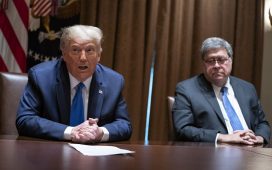With help from Tanya Snyder and Brianna Gurciullo
Editor’s Note: Morning Transportation is a free version of POLITICO Pro Transportation’s morning newsletter, which is delivered to our subscribers each morning at 6 a.m. The POLITICO Pro platform combines the news you need with tools you can use to take action on the day’s biggest stories. Act on the news with POLITICO Pro.
— Negotiations in Congress over another economic stimulus bill faltered over the weekend as airlines continued to push for grants they argue are necessary to avoid layoffs.
— Boeing’s request for government help has gotten pusback from Senate Republicans, who aren’t eager to bailout big companies.
— Democratic lawmakers are calling on the State Department to work harder to get stranded Americans home from abroad.
IT’S MONDAY: Thanks for tuning in to POLITICO’s Morning Transportation, your daily tipsheet on all things trains, planes, automobiles and ports. Get in touch with tips and feedback at [email protected] or @samjmintz.
LISTEN HERE: Follow MT’s playlist on Spotify. What better way to start your day than with songs (picked by us and readers) about roads, railways, rivers and runways?
AIRLINES HOLDING OUT HOPE AS HILL NEGOTIATES: Senators continued negotiations over the weekend on an economic stimulus bill that airlines hope will bring at least a few months of relief as travel slides to previously unimaginable lows.
Airlines have offered up both concessions and warnings as momentum among Senate Republicans is shifting toward giving them all loans rather than a mix of grants and loans. On Saturday, the top executives of major passenger and cargo airlines in the U.S. wrote to the White House and congressional leaders saying that in exchange for financial help, including “worker payroll protection grants” and loans, they would “place limits on executive compensation and eliminate buybacks and dividends for the life of the loans,” Gavin Bade writes.
As of Sunday, negotiations between the parties weren’t progressing and House Democrats planned to introduce their own bill.
In addition to the $58 billion in loans for airlines, the Senate’s bill released Sunday would provide more than $1 billion in emergency grants for Amtrak, $10 billion for airports (matching their request for aid) and $20 billion for transit grants.
BOEING CARVE OUT FACES RESISTANCE: The Trump administration’s idea of specific assistance for General Electric and Boeing has angered some Republican senators, including Commerce Aviation Subcommittee Chairman Ted Cruz. According to POLITICO’s Congress team, Cruz pushed back on the idea in a recent Senate GOP lunch. And he and his colleague Mike Lee (R-Utah) took to Twitter, too. “Millions are losing jobs; we don’t need bailouts or corporate welfare,” Cruz said. “Americans are in this together. Why would we create a special program for two companies?” wrote Lee. The airplane manufacturer has asked for $60 million in “access to public and private liquidity.”
OUR THOUGHTS: Are with Rep. Mark DeSaulnier, a Transportation and Infrastructure Committee member, who is in critical condition following a rib fracture and complications from pneumonia.
Sign up for POLITICO Nightly: Coronavirus Special Edition, your daily update on how the illness is affecting politics, markets, public health and more.
WHAT’S HAPPENING AT AUTO FACTORIES? President Donald Trump tweeted on Sunday that auto manufacturers Ford, GM and Tesla have been “given the go ahead to make ventilators and other metal products, FAST!” It’s unclear what that means. Tesla had been planning to suspend production at its Fremont, Calif., factory today. As for GM, our Tanya Snyder reported over the weekend that the manufacturer partnered with Ventec Life Systems and a private-sector coronavirus initiative to manufacture ventilators.
FRENEMIES: The State Department is planning to commit TSA to carry out two training and advisory projects in Saudi Arabia, one on last-point-of-departure security and one on the Saudi air marshal program. House Homeland Security Chairman Bennie Thompson slammed the move as “another example of the administration using the cover of a pandemic to push through a policy that they know faces opposition.”
Democrats on the committee object to entering into such an unprecedented partnership with the country whose government ordered the murder of Washington Post journalist Jamal Khashoggi and was home to 15 of the 19 9/11 hijackers, not to mention a Saudi government-vetted aviation flight student who killed three people at Naval Air Station Pensacola in December. Neither TSA nor DHS responded to a request for comment.
STRANDED: Our team has been tracking U.S. efforts to bring home Americans who are stuck abroad following border closures and flight cancellations due to the coronavirus.
The latest: The State Department is starting flights out of Guatemala, a hotspot for stranded travelers, today with two charters scheduled. Flights out of Morocco started leaving on Friday. In Peru, thousands remained over the weekend as the two governments bickered over reciprocity for the thousands of Peruvians who are also in the U.S. trying to get home. But State told Hill staff on Sunday that two commercial repatriation flights were scheduled for today out of Lima and that the government is working to secure more during the week. One issue remaining: no U.S. air carriers are certified to land at the high-elevation airport in Cusco, and State (along with DOT) is looking for foreign airlines to help out, according to an email from State’s congressional liason office obtained by POLITICO.
The issues in getting Americans back to the U.S. has caught the attention of congressional Democrats, many of whom have urged the State Department to take further steps, including activating the Civil Reserve Air Fleet. Rep. Nydia Velázquez is also introducing a bill today that would eliminate fees for Americans to board repatriation flights — in the case of those citizens stuck in Morocco, they had to sign a promissory note worth $1,485 before boarding the State-chartered planes back home.
AIR TRAFFIC CONTROL: As of Sunday night, nearly a dozen facilities across the country had been affected by personnel testing positive, according to an online map posted by the FAA. Over the weekend, the agency ordered (and later lifted) ground stops for airports in the New York area, and shut down an air route traffic control center and LaGuardia Airport’s tower overnight for cleaning.
RAISING EXPECTATIONS: FRA sent a proposed rule to the federal register on Friday that would define on-time performance for Amtrak as a measurement of the percentage of passengers who arrive at destinations within 15 minutes of the scheduled time. If that metric slipped below 80 percent, Amtrak would go through a dispute resolution process through the Surface Transportation Board. Amtrak’s overall on-time performance for fiscal 2019 was 73.6 percent, and Amtrak blames host railroads for causing many of those delays. Amtrak said the proposed rule would “produce meaningful metrics” that it hopes can be used to strengthen its case against freight railroads that cause delays.
— “Trump: U.S. can’t let cruise industry fail.” POLITICO Pro.
— “Trump to partially close U.S.-Mexico border.” POLITICO.
— “Traffic and pollution plummet as U.S. cities shut down for coronavirus.” New York Times.
— “Emirates stops nearly all passenger flights, slashes wages.” Reuters.
— “Hawaii to quarantine all arrivals to the state for 14 days.” Associated Press.
— “In need of $1 billion, Amtrak cuts management pay as it faces ‘unprecedented’ ridership loss.” Philadelphia Inquirer.
DOT appropriations run out in 190 days. The FAA reauthorization expires in 1,287 days. Highway and transit policy is up for renewal in 190 days.








